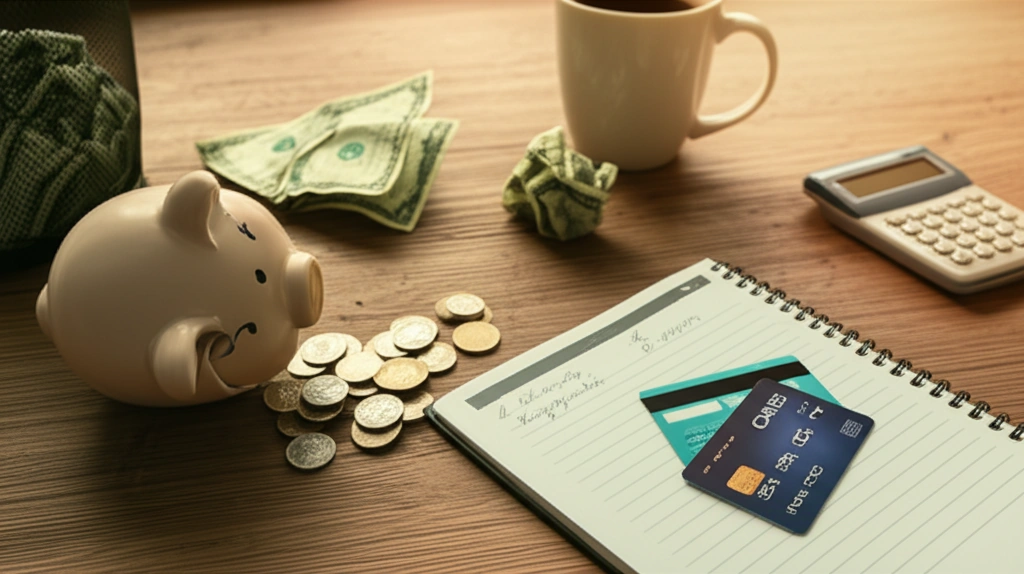Hey there! Ever caught yourself wondering, “Wait, where did all my money go?” Yeah, me too. It’s wild how sneaky bad money habits can be—slowly draining your wallet while you barely notice. But the good news? Once you spot these habits, breaking free feels like a fresh breath of financial freedom. Let’s talk about some of the most common bad money habits and, more importantly, how to kick them to the curb for good.
This isn’t about lectures or complicated finance jargon. Think of it like a chat with a friend who’s been through the same money mess and found ways out. Ready? Let’s dive in.
Why Habits Stick
Before busting those bad money habits, it’s helpful to understand why they’re so stubborn. Habits aren’t just about willpower—they’re deep-rooted patterns in our brains.
How Habits Form
Ever heard of the habit loop? It’s like your brain’s automatic script: a cue triggers a routine, and you get some kind of reward.
- Maybe the cue is boredom or stress.
- The routine? Grabbing your phone and buying something online.
- The reward? A quick dopamine hit, a feel-good moment.
That loop feels comfy, but it’s also the trap.
Behind The Scenes
It’s not just about you. Society plays a role: easy access to credit cards, subscriptions sneaking their way into your bills, and social pressure to keep up with friends or influencers. Plus, some of these habits come from how money was handled when we were growing up. Maybe shopping sprees or financial stress felt normal in your family. That’s super common and nothing to feel ashamed of.
Common Bad Money Habits And How To Spot Them
No Savings and Emergency Fund
This one’s big—and kind of terrifying. Life throws curveballs—a broken phone, medical bills, job hiccups—so having zero savings can quickly spiral you into debt. Believe me, starting small is totally okay. Even $5 a week squirreled away adds up and feels like a safety net.
Want a quick win? Set up an automatic transfer to a separate savings account. Out of sight, out of spend.
Overspending and Impulse Buys
Ever bought something just because it was “on sale” or because your friends had it? Impulse spending sneaks up on all of us!
- Try the “24-hour rule” — wait a day before buying non-essentials.
- Ask yourself: “Do I really need this, or just want it right now?”
- Keep a “fun money” bucket in your budget—so you can enjoy treats guilt-free but in control.
Living on Credit and Debt Dependence
It’s easy to treat credit cards as free money, especially when they’re handing you rewards and points. But interest can sneakily pile up faster than you expect.
The key is to have a plan. Whether you like the debt snowball method (paying off smallest debts first for momentum) or the avalanche method (tackling highest interest rates first), consistency is power here.
No Budget or Tracking
Not knowing where your money goes is like trying to fix a leaky roof without seeing the drips. Budgeting doesn’t have to be fancy or restrictive—it’s about awareness.
Even a simple app or jotting down your spending for a week can open your eyes and give you control. Just two minutes a day to glance over your spending can change the game.
Subscriptions and Small Leaks
Surprise! Those tiny monthly fees add up. Whether it’s six streaming services you barely watch or apps you used once, it’s money slipping through the cracks.
Have you audited your subscriptions lately? Grab a cup of tea, scroll through your bank statement, and cancel what you don’t truly use or love.
Emotional Spending and Retail Therapy
Money can be a comfort, right? Stressful day, bad mood, and boom—you find yourself clicking “add to cart.” I get it; I’ve been there. But those purchases often create more stress later.
Try substituting retail therapy with a walk, a call to a friend, or journaling how you’re feeling instead. It takes practice, but it’s worth it.
Bad Spending Habits Of Students
Student life can be a whirlwind of living paycheck to paycheck and social pressure. Common pitfalls include overusing credit cards, missing out on student discounts, and overspending on nights out.
Setting a tiny weekly budget for social outings and making the most of student perks can stretch your funds and keep stress down.
5 Bad Money Habits You Need To Break Now
| Habit | Why It Hurts | Simple Fix |
|---|---|---|
| Impulse spending | Wastes money on things you don’t really need. | Pause 24 hours before buying. |
| Ineffective budgeting | Loses track of money flow and can overspend. | Use a simple app or notebook to track daily expenses. |
| No emergency fund | Leads to debt when unexpected costs hit. | Automate weekly savings—even $5 counts. |
| Ignoring debt | Interest piles, credit score drops. | Make a debt repayment plan, prioritize paying extra on high-interest balances. |
| Subscription creep | Invisible monthly fees drain your money. | Audit and cancel unused subscriptions monthly. |
These 5 bad money habits are among the biggest culprits, but did you know there are 10 bad money habits you need to break today that might be affecting you? Take a peek and find out if one is your silent wallet thief.
Replacements: Better Habits To Build
Now, what do we replace all this with? Nothing groundbreaking—we’re talking basics that actually work and stick.
Automate Your Savings
Set up your bank to move a little cash from checking into savings each payday. You won’t miss what you never see.
Track Your Spending
A quick daily glance or weekly check-in helps you catch the leaks and course-correct before it’s too late.
Build A Simple Budget
Forget complicated spreadsheets. Break your income into essentials, savings, and “play” money. This keeps life fun and responsible.
Focus On Financial Goals
Whether it’s paying off debt, buying a home, or just a cushion against surprises, keeping your goals in sight helps you say “no” to impulsive spend.
For inspiration, explore good money habits and financial habits examples from folks who made these changes and saw real results.
Easy Plans To Get Started
Breaking habits isn’t instant, but you can start small. Here’s a quick roadmap:
- First 30 days: Pick one bad habit and make one simple change. No spending on impulse buys for a week? Check. Set up an auto-save?
- 90 days: Add tracking your spending weekly. See your progress and reward yourself for sticking to your plan.
- One year: Hit goals like a small emergency fund, reduced debt, or new budgeting comfort. You’ll feel like a financial warrior.
Looking Ahead With Confidence
Sure, bad money habits can feel like chains—but they’re not forever. It only takes a bit of awareness, some patience, and a few good tools in your corner.
Got a habit you just can’t shake? That’s totally normal. Remember, even people who feel like money masters started somewhere messy. The key? Keep taking one small step at a time. And hey, if you’re feeling stuck, professional advice can be a game-changer. No shame in asking for help.
So, what’s your top bad money habit? Think it over. Pick one little thing to change this week—nothing huge, just doable. That tiny shift could spark big relief, better sleep, and more headaches off your financial plate. And if you want more tips or real stories from others beating bad money habits, check out this guide. Trust me, you’ll find some gems.
Ready to start fresh? Let’s do this—your future self will high-five you.













